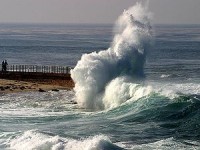So what’s my Big Question? Selecting just one question from a head full of many is quite challenging in itself, and much depends on the context I suppose. As I work in public health, I’ll take that as my context. So we know that people with the most healthcare need in the world tend to live in areas that have the smallest number and least skilled workforce to help them. So how can technology be utilised efficiently to provide immediate and longer term learning and skills attainment for people in these area? A key consideration here is access to technology and the virtual world in areas that have some of the worse infrastructure across the globe. And let us not forget the real possibility of man made or natural disasters on destroying an areas’ infrastructure and suddenly disconnecting them from the micro-chip environment – and here too is another example of people immediate access to public health knowledge, information and training of which some could potentially have been accessed and provided over the internet or mobile phone.
So my big question relates to access and access consists of a number of different components I think:
(1) Access to a physical learning portal – like a computer, mobile phone or similar. I am likening this to the pen and paper of traditional learning.
(2) Skills acquisition – unless you know how to use the computer/WWW then how are you going to access any learning opportunities.
(3) Does what you need exist? – have appropriate lecturers had access/resources/commitment to provide the learning opportunity?
(4) Access to the learning environment itself – some of the things to consider here include:
- cost
- entry requirements
- waiting lists
- start and end dates or immediate
- relevant to your specific needs
- in your spoken language
- up-to-date / credible
For seven years I have been teaching on a fully online distance learning masters programme in public health (http://manchester.ac.uk/mph) – we have students all over the world taking this course. To enroll for the course, students have had to think about some of the issues above and felt confident that they would be able to meet the minimum requirements to be able to access the learning materials. But we do find that some students struggle because life events take place, consuming their time, or that their local infrastructure changes – we had students unable to post assignments after the earth quake in China; one student who was in the army and got posted to the top of a mountain in Pakistan so had no internet connection until he returned to a lower base; villages have had power cuts and the spare parts needed to arrive took days if not weeks so the internet cafe was not open; students’ whose computer broke and they were not able to use the work computer; and so on.
Whilst computer engineers (not sure what the correct term here is!) can and do develop amazing technology, we have to make sure that it is in reality matched to the context in which it is going to be used. A friend of mine once bought a very expensive car that used petrol at a phenominal rate – he said part joking that he couldn’t afford to use the car because it cost too much in petrol. So a bit like having a great computer at home, but no internet connection (well it sort of makes sense to me).
I ‘d like to hear your experiences and thoughts about my Big Question and to find out more about problems you’ve encountered and any ways to over come them, relating to access.
thanks
Roger
